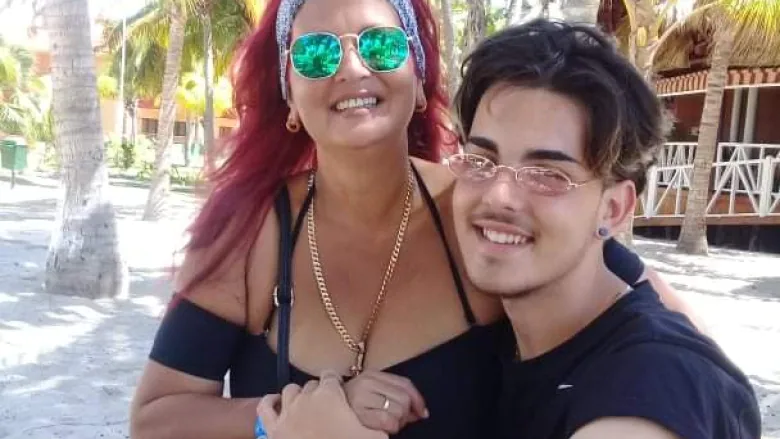Published:November 3, 2021
-CBC
A Canadian citizen jailed by Cuban authorities during unprecedented protests for political change on the island has been sent to a “work brigade” to do hard labour despite serious health problems, according to his family and advocates.
Michael Carey Abadin, 19, was living in Old Havana with his Cuban mother when spontaneous protests broke out on the island on July 11. He was planning to leave and study in Canada and already had a plane ticket, his mother told CBC News, but his flights were repeatedly cancelled because of the COVID-19 pandemic.
He was arrested the day after protests broke out in at least 40 cities across the island and accused of throwing a rock at a patrol car. Prosecutors have charged him with damage to public property and are seeking a five- to six-year prison sentence.
The young man first contracted COVID-19 in custody and then hepatitis and HSV-1 (non-genital herpes), which is widespread in Cuban prisons. Ultimately his condition became so severe that he was transferred to the infirmary at Jovenes de Occidente prison on the outskirts of Havana.
‘Even worse condition than before’
Hepatitis caused his skin to turn yellow, and herpetic lesions spread over his body.
His mother, Yvis Abadin, says she was visited by a police captain at home after CBC News first published details of his detention. Shortly after that, her son was taken out of the infirmary and put into a “work brigade”, cutting brush with a machete.
“My son is in even worse condition than before,” she said. “Now he has lesions on his legs that are suppurating.”
Officials at the Cuban Embassy in Ottawa and in Havana have not responded to questions about his detention or the charges against him.
Hard labour
Work brigades (“brigadas de trabajo“) are a common feature of the Cuban prison system, said Juan Pappier of Human Rights Watch. “They use the prisoners for agricultural work, building work, normally very tough work in abusive conditions.”
Pappier said that in some cases such an assignment could be a harbinger of good news. “Sometimes this happens just before some kind of parole.”
But Pappier also noted that releases of political prisoners in Cuba have slowed down as the government braces for new protests planned for November.
Of approximately 3,000 people detained on July 11 and 12 this year, most were released within a short period of time, often under strict conditions or into house arrest. Many have already undergone summary trials and received sentences of up to one year. Over 500 remain in prison and the Cuban state is seeking sentences of up to 18 years in those cases.
‘Horrible’ prison conditions
Prisoners in Cuba are typically not fed properly, and family members are expected to bring food for them to the prison, as Yvis Abadin has been doing.
She told CBC News that she rises at 5 a.m. every day to try to obtain basic supplies to take to her son and then has a long journey each way on public transport. Cubans stand in line for hours to purchase basic necessities and are only allowed to purchase a small amount at a time.
Yvis Abadin says she’s only allowed to see him for a few minutes every two weeks. Most days she merely delivers supplies such as crackers and chips.
On a per capita basis, Cuba imprisons about five times as many people as Canada. “This is a country that imprisons a lot of people and the prisons have horrible conditions,” said Pappier.
Police officers are the only witnesses against Michael Carey Abadin, whose mother says was arrested at random by men in civilian clothes an hour after somebody else threw a rock at a police car.
Consular visits denied
Cuban law does not ban dual citizenship, but does not recognize foreign nationality for any Cuban citizen who is on Cuban territory. For that reason, Cuba has not allowed Canadian consular officials to visit Abadin in prison, as required by the Vienna Convention on Consular Relations, to which both Cuba and Canada are signatories.
On Monday, Canadian consular case management officer Crystal Persaud wrote to Yvis Abadin that, “I assure you that Michael’s case is of utmost importance to the Government of Canada, and consular officials remain engaged with Cuban authorities as they work to obtain consular access and communicate directly with your son.”
But Canada has not made any public démarches with the Cuban government over the issue.
Yvis Abadin says the Canadian government is not doing enough for her son.
It’s not the first time that family members and advocates for Canadians imprisoned in Cuba have complained of little help from Canadian authorities focused on maintaining good relations with the regime in Havana.
While there are a number of Canadian citizens in prison in Cuba for reasons ranging from boating accidents to business disputes, Abadin is the only one held as a result of this year’s pro-democracy protests and considered a political prisoner by groups such as Human Rights Watch.
The Liberal government has sought to maintain close ties with Cuba’s one-party regime, which Prime Minister Justin Trudeau described as an “ally” when he visited the Cuban leadership in Havana in one of his first overseas trips as prime minister.




